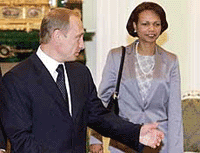Condoleezza Rice expressed her concern over Russian media shortly after she arrived in Moscow
Kremlin was tightening its grip on the Russian media and the media was becoming more pliable, Rice believes

U.S. Secretary of State Condoleezza Rice arrived in Moscow on Tuesday. It is her first visit to Russia in a capacity of the head of U.S. Department of State. She arrived in Moscow to make preparations for a meeting between U.S. President George W. Bush and Russian President Vladimir Putin that is slated for May 9th. 
Condoleezza Rice's first trip to Moscow did not proceed as planned right from the very beginning.
No sooner had U.S. Secretary of State arrived in Moscow than she made a statement in the airport. She said that the Kremlin was tightening its grip on the Russian media and the media was becoming more pliable. She called the above developments “a very alarming signal,” Reuters reported. “We are concerned about the centralization of power in the hands of the president at the expense of such institutions as the State Duma and independent judiciary.” She also expressed concern about the lack of independent Internet media in Russia.
Speaking shortly after her arrival in Moscow, Ms. Rice said despite the slowdown of democratic reforms in Russia, she saw no signs indicating that Russia could get back to totalitarianism. As regards the current process of democratic fermentation in Russia, Ms. Rice pointed to the Russian opposition poised to fight in the 2008 presidential election. She also spoke about the pensioners that took to the streets earlier this year following the replacement of in-kind benefits with cash payments.
U.S. Secretary of State told the reporters that during her talks in Moscow she would also discuss issues relating to high oil prices on the world market. She said that USA was going to put pressure on Russia so that it would increase oil production. America could return the favor by advising U.S. oil companies to step up investment operations in the Russian oil industry. Ms. Rice also that the expulsion of Russia from the Group of Eight was out of the question, New York Times reported. Ms. Rice said that President Putin had repeatedly stated that he had no intentions to run for president after his second term. She said that U.S. administration would like to hope that President Putin was going to keep his promise.
Ms. Rice was on her way to Renaissance Moscow, a hotel located on Olimpiiski Prospect, when the security service raised the alarm at the hotel after receiving an anonymous call that a bomb had been planted in the hotel. The motorcade immediately changed direction and went straight to Spaso House, an official residence of U.S. Ambassador to Russia Alexander Vershbow. The Russian police and security personnel searched the hotel for the bomb, but to no avail. “No explosive devices were found in the hotel as of 19.30 Moscow time,” said a spokesman for the Russian police.
According to a statement released by press service of U.S. Embassy in Moscow, Condoleezza Rice will be staying in Renaissance Moscow. She is not going to change her plans due to a false bomb alert.
U.S. Secretary of State is expected to hold talks with President Putin during her two-day trip to Russia. The parties will be discussing the implementation of agreements reached in Bratislava and a timetable of summits between the leaders of USA and Russia. Mr. Rice said earlier that she was going to tell the Russian government that “everybody could only benefit from a democratic, vigorous, and prosperous Russia.”
Condoleezza Rice said the two countries should look for a new way of bilateral cooperation to ensure uninterrupted movement of Russia toward a more democratic and open society with market economy.
International NGO Reporters Without Frontiers called on U.S. Secretary of State to raise the issue of freedom of the press during her visit to Moscow. Human rights activists say that an appalling trend is taking shape in Russia. The number of brutal assaults on journalists is growing. According to data collected by the organization, at least 17 Russian journalists sustained grave injuries due to their professional activities. Three journalists received threats. Two journalists were assaulted in March this year. “Violent crimes committed against the journalists constitute the most serious threat to freedom of the press in Russia,” says an appeal released by the organization.
The journalists are being intimidated while the perpetrators are getting away with their crimes. These two factors combined will create perfect conditions for self-censorship and the disappearance of the free press. The members of the organization point out that “the independent press in Russia is shrinking like a piece of shagreen leather.” Foreign reporters are also concerned about “an alarming lack of pluralism in the electronic media” and the monopolization of advertising industry by Video International, a company controlled by the Kremlin. As a result, Video International lays down the rules and the Russian independent newspapers have to follow them if they want to survive on the market. The newspapers are told to refrain from mentioning the war in Chechnya and in no case publish any appeals for peace talks with Chechen rebels.
The Russian Foreign Ministry said earlier that “maintaining a good relationship with the United States remains one of the top-priority issues to the Russian foreign policy.” The Russian Foreign Ministry also said that “despite our disagreement on certain methods for tackling sensitive issues of the modern world, Russian-American relations have been making progress in the last few years.”
AP photo
Subscribe to Pravda.Ru Telegram channel, Facebook, RSS!


